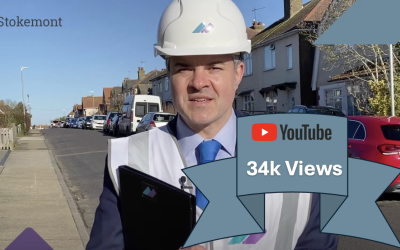If you own a property in a leasehold ownership, and intend to carry out works to your property, whether these are structural and non-structural basis. From a legal perspective and in all likely cases as per the wording of your lease, you will need to adhere to the licence for alterations requirements and obtain your freeholder’s consent.
In almost all cases, the lease will require you to obtain your freeholder’s consent, so as the first point of call, we’d advise checking the lease’s wording.
Don’t worry if you’ve tried and aren’t able to locate it! Leases are usually quite wordy to say the least! Here at Stokemont, we offer a free lease review service where we’ll check the lease and confirm what the requirements of the alterations clause is.
Once you’ve established this, the next step will be to commence the licence for alterations process.
When do I Need a Licence For Alterations?
There’s a fair few different situations when you need to get a licence for alterations. Overall, the requirements will depend a lot on the scope of your intended alterations and the clauses set out in your lease.
We thought we’d give you an overview of the most common causes for a leaseholder having to obtain licence for alterations consent:
- Altering the fundamental structure of the property.
- Making alterations inside the property to the layout of the building.
- The installation of new facilities which are sanitary in nature.
- Changing or replacing entrance doors and windows.
- Changing or replacing carpet for a wooden floor.
- Changing or installing heating or service installations.
You should be aware that this list is not exhaustive. We’d advise you seek surveying advice well in advance of commencing the works as that will very much ensure you’re the right side of the leases alteration requirements.
From a general point of view, the vast majority of property leases will have 3 different type of alterations covenants.
Absolute Covenant:
This type of covenant is fully and absolute in prohibiting alterations works. In a nutshell, you cannot carry out any kind of alteration to the property unless the landlord either gives permission to do so. This is the worst type of covenant clause you can find. We’d very much hope your conveyancer made you well aware of this at the property purchase stage. If they didn’t, you’ve potentially got grounds for a claim.
Qualified Covenant:
This type of clause means that you cannot make alterations to the property without the express consent of your landlord. Again, not an ideal situation as there isn’t a requirement for the landlord or freeholder to give you that consent. You’ll likely find it comes with a hefty financial premium attached to it!
Fully Qualified Covenant:
Finally, you’ve got a fully qualified covenant clause. This is bar far and wide the most common of the three, while it prohibits any alterations, it further sets out that, they cannot be made without the consent of your landlord, but does usually stipulate that consent for making amendments and alterations cannot be withheld unreasonably. In a nutshell, you’ll get the consent, so long as the approach is reasonable.
How Do I Get a Licence?
Getting the license for alterations is actually quite a straightforward process, however as with any process, can have bumps along the way!
First and foremost, you, or your Surveyor, will need to notify the landlord of the type of works you intend to do.
The key to obtaining consent, is to give the landlord a robust information pack, this will go a long way to spoon feeding them the information and avoiding both cost and time delay.
Once, all the information has been reviewed and agreed, it is then a matter of drafting the licence for alterations.
What Happens if I Don’t Obtain a Licence for Alterations?
If you do not obtain a license for alterations and the lease requires you to do so, from a legal perspective you will be in breach of the terms of your lease.
This could, and most likely will mean that the landlord takes action against you. While the action can be far and wide, it could, albeit it’s very unlikely, be to apply for the property to be returned to them!
Licence for alterations procedures are best approached carefully and logically, if you’d like to discuss your licence for alterations requirements with our team of Surveyors, give us a call today.




